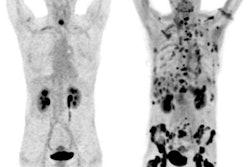German researchers are developing a PET tracer to make the diagnosis of widespread tumors easier on patients, according to a proof-of-concept study published in the September issue of the Journal of Nuclear Medicine.
The gallium-68 (Ga-68) tracer targets cancer-associated fibroblasts, which are present in more than 90% of epithelial carcinomas, including pancreatic, colon, and breast cancer. These fibroblasts are involved in tumor growth, migration, and progression, and they highly express fibroblast activation protein (JNM, September 2018, Vol. 59:9, pp. 1373-1379).
"The fact that overexpression is associated with a worse prognosis led to the hypothesis that fibroblast activation protein activity is involved in cancer development, as well as in cancer cell migration and spread," said study co-author Dr. Uwe Haberkorn from the University Hospital of Heidelberg in a statement from the Society of Nuclear Medicine and Molecular Imaging. "Therefore, the targeting of this enzyme for imaging and endoradiotherapy can be considered as a promising strategy for the detection and treatment of malignant tumors."
In mouse models and PET/CT scans of three patients, the tumors showed high tracer uptake, and the tracer was expelled quickly from the body. The researchers were able to obtain high-contrast images with low binding to healthy tissue, they reported.
In addition, the Ga-68-labeled tracer outperformed FDG in terms of contrast and tumor uptake in many tumors, Haberkorn noted.



















